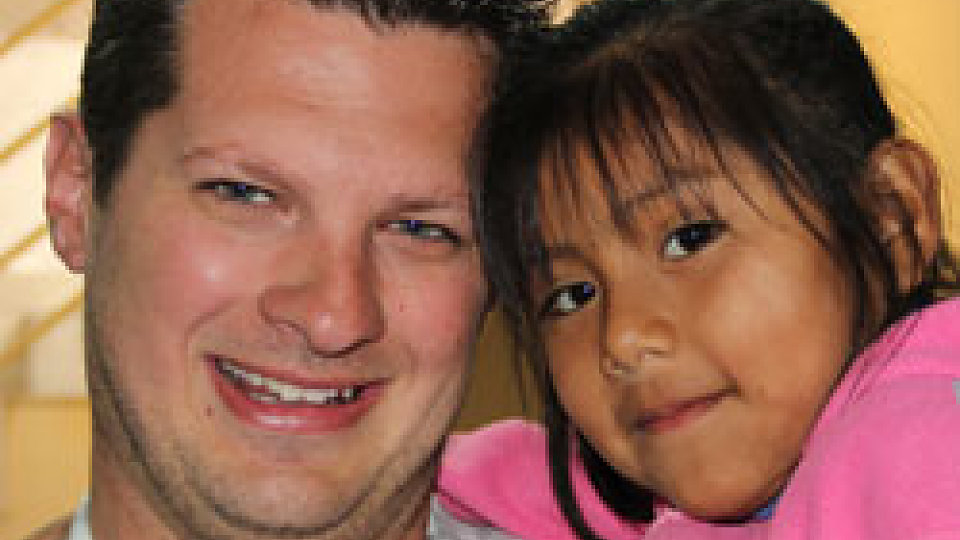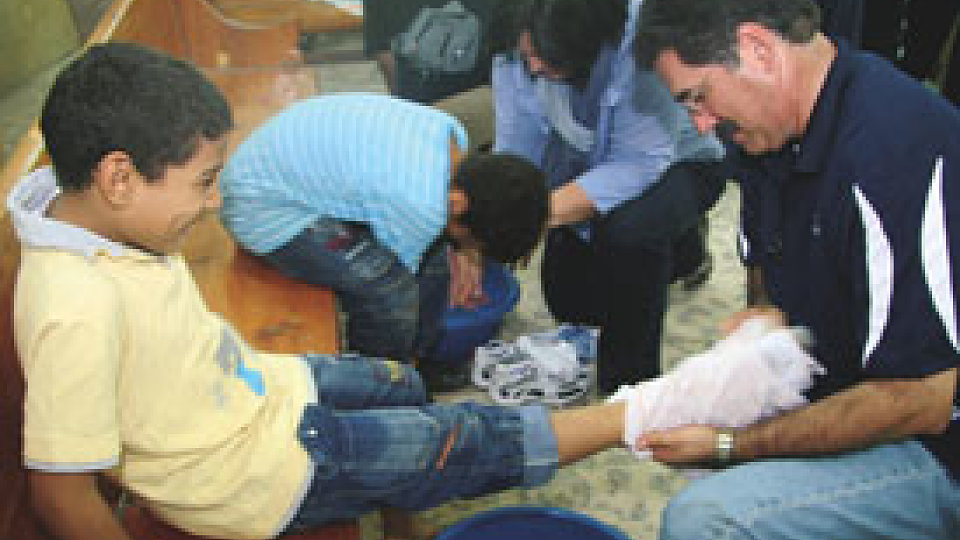Hands and feet: Shoes for Orphan Souls® walking boldly into the future
By Scott Collins
For a guy who makes a living with his voice, Tim Sinclair knows feet. He’s seen just about every size and color – small ones and big ones; black, white and brown. He’s seen dirty feet and dirtier feet. He’s washed them and tickled them.
“Feet are interesting things,” Sinclair declares in his booming voice. “And what I mean is, it’s a very personal thing to touch somebody else’s foot.”
Sinclair is the morning co-host for radio station WBGL in Champaign, Ill., and for the past three years, he and his co-host, Pam Peoples, have led a Buckner Shoes for Orphan Souls mission trip to Peru for their listeners. In those three years, Sinclair has put shoes on hundreds of children’s feet.
Like anyone who has put shoes and socks on a child during the past 15 years that Buckner has operated the ministry, Sinclair’s mind goes straight to Jesus washing His disciples’ feet.
“Jesus talks about washing feet and if you’ve ever been at a church where you wash each other’s feet, it can be a little uncomfortable just because of how personal that is.”
Albert Reyes knows the feeling. The Buckner President and CEO relates to Sinclair and the thousands of volunteers who have traveled to far-flung corners of the world since 1999 to share shoes and the love of Christ with children.
“I think if I were to think about the impact of a pair of shoes, it does sort of paint a picture of what it looked like for Jesus to be in front of His disciples and wash their feet,” Reyes says.
“Whenever you get into that position and that posture, it’s imitating the One we follow, whose name is Jesus of Nazareth. So when we take a pair of shoes and kneel before a child and wash their feet and dry their feet, put a brand new pair of socks on and then a brand new pair of shoes on, we are kind of imitating Jesus.”
While the Shoes for Orphan Souls project has definite biblical overtones and portrays Jesus’ definition of service, it found its start for a more practical reason 20 years ago.
Dallas-based radio station KCBI, then under the direction of Ron Harris, launched Shoes for Russian Souls in 1994. It grew out of a direct need Harris saw during a trip to Russia visiting orphanages.
“That was just a few years after the (Berlin Wall) had come down and the country had opened up a bit,” Harris remembers. “Our group went from place to place, and we were captivated by the kids, the dynamics of their lives and yet how little they had.”
Harris was impressed with the care the orphans received from their Russian caregivers. At the same time, “they had almost nothing to do it with. We talked to orphanage directors [about what we could do], and what emerged again was a need for shoes. Almost every list was shoes. ‘We desperately need shoes.’”
Harris returned to Dallas, took to the airwaves on KCBI and began asking listeners to give shoes for Russian orphans.
“Our mind said we might get 400 or 500 pairs of shoes,” Harris says. “What a great deal that would be. That might be two, maybe three orphanages that we could help. At the end of the day, we had 5,000 to 6,000 pairs. It was astounding.”
From 1994 to 1998, KCBI collected shoes and shipped them to Russia, followed by a mission trip for listeners to join Harris to put the shoes on the children’s feet. Each year, the collection gathered between 5,000 and 6,000 pairs.
“I think people can visualize what it would be like to not have shoes, to visualize children who have a need, a basic need that cannot be met easily in those countries.”
Toward the end of those first five years, Harris and the team at KCBI knew sustaining – much less growing – the program was too much. It was time to either find an organization to take over the program or bring it to an end.
In 1998, before KCBI’s last shoe drive, Harris was in Russia to plan the upcoming drive and mission trip – and to tell orphanage directors that this would be the last campaign.
“I was trying to prepare them,” he says. “I said, ‘This is going to be the last year that we’ll do the shoes project.’ They [directors] just said, ‘Oh no! What will we do? We count on these. This means so much.’”
Although Harris and KCBI were ending their involvement with the shoes project, he didn’t give up on finding someone else to take it over. On the trip in 1998, Harris encountered Mike Douris, then Buckner’s vice president for international operations.
“We met him in the hallway and we blocked him and we said Buckner must take this project, because the need is great and yet we just feel the need to move on,” Harris says.
Buckner ran it as the Shoes for Russian Souls program in 1999. But that first year, the numbers ballooned from KCBI’s 5,000 to nearly 20,000, more than Buckner could ship and distribute in Russia alone. The next year it became Shoes for Orphan Souls.
Ken Hall was President and CEO of Buckner at the time, and he recalls the impact Shoes for Orphan Souls had across the entire organization. “It was an interesting time to see how we would transition from an era of what we knew as Buckner Baptist Benevolences to this new international ministry we were creating.”
He sees the Shoes for Orphan Souls program as a “conduit for what really took place.”
“I’d love to tell you that we had this grand plan and that Shoes for Orphan Souls was going to be the conduit under which we would launch this new vast international ministry,” Hall says with a grin. “To be frank and to be honest, I know that God did this in a way that not any of us were smart enough or capable enough to know how to do it.”
Fifteen years after taking over the Shoes for Orphan Souls program, Hall credits it with setting the stage for an entire humanitarian aid program that includes the 45,000 square foot Buckner Center for Humanitarian Aid.
“Looking back, I see that God uniquely gave us the gift of Shoes for Orphan Souls as a launching pad to connect with so many people,” Hall says. “For me, it’s one of those things where you look back and see that the Father really does have a plan; our responsibility is to be faithful and to be courageous and at the same time, humble enough to know we’re not smart enough to figure it out ourselves and let Him do it for us.”
As Hall’s successor, Reyes, admits, “I can’t really envision Buckner without Shoes for Orphan Souls. There’s always going to be a need for children to have shoes.”
Shoes for Orphan Souls shows no signs of slowing down. Statistically speaking, the program finished one of its strongest years ever in 2013 with a record number of shoe drives in all 50 states. More than 1,600 shoe drives were held across the country. Shoes were distributed in 32 countries in 2013, and 205 people traveled with Buckner to place shoes on children’s feet.
For his part, Harris sees his role in starting the program and then giving it to Buckner as a career highlight.
“To see the growth and the impact of it, to see it go from maybe one region in Russia to have a worldwide impact; to see not just listeners of one radio station giving shoes, but people all over the country getting caught up in the idea that we can make a difference in somebody’s life and to be able to give out of their own resources, out of their heart, is exciting to see what God is doing,” Harris says.






Add a Comment